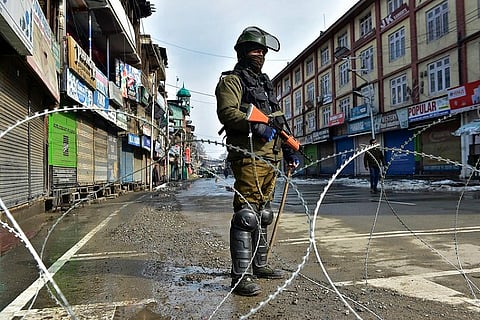

Internet shutdowns are becoming the new normal in India. At the time of writing, internet services had been shut down in Jammu and Kashmir for 135 days, had been snapped in Aligarh for a period of 24 hours soon after protests broke out, and have also been shut down in various parts of West Bengal, Assam, Tripura and Arunachal Pradesh.
According to the Software Freedom Law Center (SFLC), which tracks internet shutdowns across the world, India has now earned itself a dubious distinction, as it is now widely being reported as the “internet shutdown capital” of the world.
International non-profit Access Now defines internet shutdowns as “an intentional disruption of internet or electronic communications, rendering them inaccessible or effectively unusable, for a specific population or within a location, often to exert control over the flow of information.”
According to the Washington Post, apart from Kashmir, only countries such as China and Myanmar which have authoritarian regimes have shut the internet down for longer.
According to the Hindu, this is Jammu and Kashmir’s second-longest internet shutdown (still ongoing). Previously, following the death of Hizbul Mujahideen commander Burhan Wani, the newspaper stated that an internet shutdown lasted for 202 days.
SFLC, which has kept tab of the internet shutdowns, says thatnthere were three shutdowns in 2012, five in 2013, six in 2014, 14 in 2015, 31 in 2016, 79 in 2017, 134 in 2018, and up until now they have calculated 93 in 2019. However, this 2019 number is expected to increase.
It further stated that 60 of the 278 Internet shutdowns between January 2012-2019 lasted less than 24 hours. "55 lasted between 24 and 72 hours, 39 lasted for over 72 hours, while no information was available on the respective durations of 113 Internet shutdowns," SFLC said.
Internet shutdowns are an often used tool in the country to crackdown on dissent. Jammu and Kashmir after the abrogation of Article 370, multiple states in the north-east and in Aligarh over the Citizenship Amendment Bill. Each time the government makes a decision on something that is controversial, snapping internet connections is one of the first moves.
It’s often impossible to know the total number of shutdowns, as the Department of Telecommunications does not maintain data, according to the government. SFLC says it gets its data from newspapers, as not even filing an RTI gives one the complete picture of shutdowns.
Internet shutdowns are governed by either Section 144 of the CrPC under a set of rules by the Ministry of Communications and Information Technology, and is issued under the Telegraph Act.
Internet shutdowns are not just about curbing dissent, but also have an economic cost attached to it.
A report titled ‘The Economic Impact of Disruptions to Internet Connectivity’ by the Global Network Initiative today stated that it could cost a high-connectivity country at least 1.9% of its daily GDP for each day all internet services are shut down. “For an average medium-level connectivity country, the loss is estimated at 1% of daily GDP, and for an average low-connectivity country, the loss is estimated at 0.4% of daily GDP,” it stated.
According to a report by the Indian Council for Research on International Economic Relations in April 2018 (prior to some of the longest internet shutdowns in India), 16,315 hours of internet shutdowns in India cost the economy approximately $3.04 billion between 2012 to 2017. 12,615 hours of mobile Internet shutdowns in India cost the economy approximately $2.37 billion during the period 2012 to 2017, and 3,700 hours of mobile and fixed line Internet shutdowns in India cost the economy approximately $678.4 million during the same time period.
In a written representation to the Ministry of Home Affairs and the Department of Telecommunications, the Internet Freedom Foundation states that having internet connection enables messages of calm and peace to be broadcast through social media, and is a medium that even Prime Minister Narendra Modi has used.
“Press reports indicate large scale police excesses toward peaceful protests and the ability to access internet services is vital during these moments of unrest; it enables the transparent documentation of events and also creates a level of accountability and restraint in policing responses,” the statement said.
The internet was declared as a human right in a UN report in 2011, and with the Modi government stating that it truly wants to be ‘Digital India’, it's crucial that they do not curb internet access at the times it is needed the most.